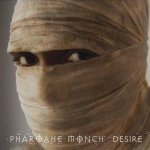
Pharoahe Monch Desire
(Street Records Corporation / Universal)
Pharoahe Monch, leading up to the release of his long awaited disc, Desire, has been a notable victim of industry boondoggling. After an innovative run as half of the underground duo Organized Konfusion in the 90s, his solo debut, Internal Affairs, was released on Rawkus when they were still the strongest, most prominent force in independent hip hop. That album's leadoff single, Simon Says, was a monster anthem, indelibly commanding the world to get the fuck up. The famous sample that song was based around, from the Godzilla films, was unfortunately not cleared by the label, leading what should have been a triumph to be ceased and desisted, complicating the distribution of a promising, classic first album. That was over seven years ago, and label red tape has prevented Pharoahe Monch from delivering his follow-up until now.
Desire confirms that Pharoahe Monch is indeed one of the greatest emcees alive, not a legend inflated in his absence. The rhymes are not allowed to overwhelm canny production and beats by 99 Fingaz, the Alchemist, Black Milk and others including Monch himself. As refreshing and crisp as the music can be, however, the words cannot help but be the show. The delivery is peerless, booming and energetic without ever seeming to shout, relaxed and prodigiously nimble and quick tongued, confidently dancing around complex clusters of words and ideas that would tie up and vex even a competent, experienced rapper, then adjusting, skewing, and twisting this skill set to make specific songs and verses distinct. Every track is dense with layers of metaphor, pun, reference, punchline, and linguistic dexterity. It is a little bit overwhelming, but not oppressively so. Though it takes multiple listenings to begin to grasp a great deal of what Pharoahe Monch is doing with his words and how he says them, it is never impenetrable. Everything can be followed and enjoyed line to line, but the retrospective accumulation is what dazzles.
Pharoahe Monch also has a gift for avoiding the insufferability that tends to infect some high minded independent hip hop. The album covers a plethora of moods and subjects, but it never feels like he is resentfully boasting about his own superiority or chastising the failures of the rest of culture. He is not, however, a typical mainstream rapper who happens to have exceptional skills. Conspicuous consumption and materialism are noticeably absent and presumably irrelevant. Sex and violence are not avoided, but not flaunted, either. Every time Pharoahe Monch approaches these subjects that could be considered obvious, there is a novel perspective, idea, sound or conceit to justify their presence.
Sexwise, Bar Tap segues from conversational bluster to masterful Monchian language tapestry to inebriated half crooning to Midwestern slang parody to a backdrop that evokes the most bubbly, buzzy phase of intoxication. Single Body BabyM, while an anthem to physical desirability, is genuinely odd, adjusting the Pharoahe's NYC hip hop to a brassy juke joint swing that even inspires him to sing the lecherous, retro chorus. The handling of violence is miles away from the spectacle of more commercial hip pop, fully considering the damage, destruction and horror that violence entails. When the Gun Draws is a predatory, bloodthirsty stalker from the point of view of a gun itself, then an elaborate cascade of conspiracy reflecting on the damage of gun violence sprawling all over 20th century America from JFK to Tupac. Crime narrative Trilogy is a vivid Rashomon style epic, complete with musical shifts for each of its phases.
Elsewhere, Pharoahe Monch is a whirlwind of verbal invention. Desire takes driving string samples as a backdrop for the returning icon to reassert his dominance and hunger ('this is the moment of truth for my opponents and liars/ talk alone evokes the emotion of black choirs'). What It Is takes a spare, tense beat to drop a dizzying, relentless succession of cultural referents ('before Morpheus and Neo was killing them we was ducking roulettes in the hood like Remo Williams'). Let's Go, Free, Push and other tracks provide further spotlights for Pharoahe Monch's verbal superiority. Hold On is a heartfelt but amazingly lucid and unembarrassing ode to the struggles of black women and their perception featuring Erykah Badu.
Though Pharoahe Monch admirably gives the instrumental aspects and his additional vocalists the care and room they deserve, Desire is most memorable as a collection of amazing verses. Not only is there not likely to be better rapping this year, Desire is the kind of album that reminds one of why emcees matter and just how much they can do.
12 July, 2007 - 18:00 — George Booker